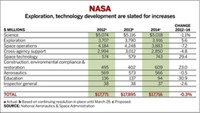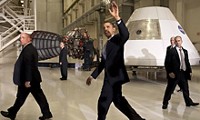Advertisement
Grab your lab coat. Let's get started
Welcome!
Welcome!
Create an account below to get 6 C&EN articles per month, receive newsletters and more - all free.
It seems this is your first time logging in online. Please enter the following information to continue.
As an ACS member you automatically get access to this site. All we need is few more details to create your reading experience.
Not you? Sign in with a different account.
Not you? Sign in with a different account.
ERROR 1
ERROR 1
ERROR 2
ERROR 2
ERROR 2
ERROR 2
ERROR 2
Password and Confirm password must match.
If you have an ACS member number, please enter it here so we can link this account to your membership. (optional)
ERROR 2
ACS values your privacy. By submitting your information, you are gaining access to C&EN and subscribing to our weekly newsletter. We use the information you provide to make your reading experience better, and we will never sell your data to third party members.
Environment
NASA, Lost In Space
Report finds agency is adrift without clear goals, and U.S. leadership in space science will suffer
by William G. Schulz
January 14, 2013
| A version of this story appeared in
Volume 91, Issue 2

The nation’s space program, run by the National Aeronautics & Space Administration, today finds itself rudderless, lacking national consensus on strategic goals and objectives. This lack of direction is hobbling the agency, and it means the U.S. risks losing its leadership position in human space flight, earth and space sciences, and aeronautics.
That’s the primary—and unusually harsh—conclusion of a National Research Council (NRC) study of NASA that was released in late December 2012. The report encourages officials in the Obama Administration and members of Congress to work with NASA to develop a strategic plan with clear goals and outcomes. But a congressional hearing following the release of the report made it clear that the current budget crunch is going to make that very hard.
NASA now faces major challenges in all of its primary endeavors. At the same time, the agency’s budget has remained flat and has forced programs to be underfunded. “Numerous times the agency initiated new programs with the expectation that budgets would increase to support them only to have no increases emerge,” the NRC report says.
For example, the report notes that the high-profile Mars Curiosity mission helped develop U.S. expertise in robotics space exploration. But the Mars exploration budget has been cut, casting doubt on future missions and continued U.S. leadership. The report also notes that NASA’s planetary science program includes many active spacecraft. “They are rewriting our current understanding of the formation and evolution of the solar system, contributing to the search for the existence of past or even current life on other planets, and assisting in the understanding of exoplanets,” the report says.
The strategy problems “are not primarily of NASA’s doing,” reads the report, “but the agency could craft a better response to the uncertainty.”
“It’s not likely with this Congress—and this electorate—that we can expect vast sums for the moon, Mars, or an asteroid,” House of Representatives Committee on Science, Space & Technology Chairman Ralph M. Hall (R-Texas) said of the budget realities the country faces. “We can’t go to Mars until our people can go to the grocery store.”
During a science committee hearing last month, Hall also laid some blame on the Obama Administration for NASA’s current lack of focus, which he believes needs to involve a specific destination in space for human missions. He noted that President Barack Obama, in his 2011 budget request, canceled the agency’s Constellation Program. This program’s goal was to return humans to the moon and explore beyond it.
“By canceling the Constellation Program, NASA has lost international partners who supported a mission to the moon,” added committee member Rep. F. James Sensenbrenner Jr. (R-Wis.). “President Obama took a ‘been there, done that’ approach. But we haven’t been there in 40 years, and the international partners who would have helped us have never been there.”
But without a consensus on the agency’s future direction, NASA “cannot be expected to develop or work effectively toward long-term priorities” testified Ronald M. Sega, vice chair of the NRC committee that wrote the report and a former astronaut who now holds a joint appointment leading energy and environmental strategy at Colorado State and Ohio State Universities. “There is a mismatch between the portfolio of programs assigned to the agency and the budget allocated by Congress,” he said.
This mismatch is a real problem for the future of science and innovation in the U.S. “It may only be in retrospect that we will learn the true costs of walking away from investments in R&D agencies such as NASA,” said ranking science committee member Rep. Eddie Bernice Johnson (D-Texas). “But I firmly believe that those costs will be high and long-lasting if we go down such a destructive path. I hope we don’t do so, because other nations increasingly recognize the benefits that a strong and active space program can deliver, and as a result we see them being willing to make the necessary investments to build their capabilities even in days of austerity.”





Join the conversation
Contact the reporter
Submit a Letter to the Editor for publication
Engage with us on Twitter